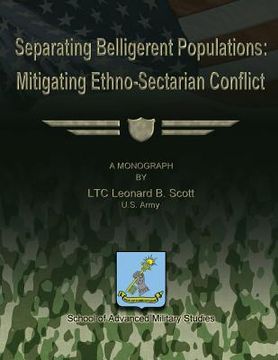Compartir
Separating Belligerent Populations: Mitigating Ethno-Sectarian Conflict (en Inglés)
Us Army Leonard B. Scott
(Autor)
·
Createspace Independent Publishing Platform
· Tapa Blanda
Separating Belligerent Populations: Mitigating Ethno-Sectarian Conflict (en Inglés) - Studies, School Of Advanced Military ; Scott, Us Army Leonard B.
$ 115.478
$ 177.659
Ahorras: $ 62.181
Elige la lista en la que quieres agregar tu producto o crea una nueva lista
✓ Producto agregado correctamente a la lista de deseos.
Ir a Mis Listas
Origen: Estados Unidos
(Costos de importación incluídos en el precio)
Se enviará desde nuestra bodega entre el
Viernes 05 de Julio y el
Viernes 19 de Julio.
Lo recibirás en cualquier lugar de Colombia entre 1 y 5 días hábiles luego del envío.
Reseña del libro "Separating Belligerent Populations: Mitigating Ethno-Sectarian Conflict (en Inglés)"
Ethnic and sectarian conflict is a prevalent form of conflict today. Most of the conflicts ongoing today and in occurring the past twenty years have been internal wars between rival groups with ethnic or sectarian identities. Though its causes vary, the brutal nature of its conduct and its far-reaching consequences make it a threat that the international community cannot ignore. As result, the international community has debated the extent to which it should intervene, if ever, in such conflicts. By its actions, the international community has demonstrated its willingness to intervene, often with military force, to mitigate ethnic conflicts. The past twenty years has seen a series of military interventions that have varied in purpose from humanitarian assistance to nation building. Although many of the military interventions have been only marginally effective at best, there is every reason to believe that the international community will continue to intervene to mitigate future conflicts. United States' military doctrine and tactics, techniques and procedures (TTP) does not specifically address ethnic and sectarian conflict like it has recently done with insurgencies. Its peace operations and subordinate peace enforcement operations doctrine and TTP form the basis for thinking about how to approach military interventions amid ethnic and sectarian conflict. Two relevant peace enforcement operations to consider are separating belligerents and establishing protected areas. Those two peace enforcement tasks are based on an underlying assumption of separation of populations in ethnic conflict. Amid such conflict, the rival populations separate as people flee or are forcibly expelled from their homes. Intervention occurring in such conditions can apply variations of the two peace enforcement operations to maintain the separation of the rival populations and thereby lessen the conflict. The approach an intervention force pursues is largely dependent on the degree and geographic extent of separation that it encounters. Situations where populations that have separated completely, either regionally or locally, lend themselves to a separation zone being established between the sides. The Bosnian War is an example of a regional separation using a separation zone, while the city of Mitrovica in Kosovo is an example of a divided city. Situations where rival populations are intermingled, either regionally or locally, lend themselves to the establishment of protected areas for the ethnic enclaves. The United Nations safe areas of the Bosnian War are regional examples of protected areas, while the Baghdad "gated communities" established by Multi-National Corps-Iraq are local examples. The examples demonstrate that such operations are both feasible and at least potentially adequate for military intervention forces to accomplish. Though military forces can effectively separate rival populations to mitigate ethnic conflict, there is much debate whether it is acceptable to do so. Opponents of separation point out its long-term negative consequences and believe those outweigh any short-term benefits to reducing violence. An advocate for separation regards the immediate cessation of conflict as the only means by which the long-term desired effects can be achieved. Ultimately, the increasing trend of many countries resorting to separation measures in order to mitigate conflict demonstrates separation's utility.
- 0% (0)
- 0% (0)
- 0% (0)
- 0% (0)
- 0% (0)
Todos los libros de nuestro catálogo son Originales.
El libro está escrito en Inglés.
La encuadernación de esta edición es Tapa Blanda.
✓ Producto agregado correctamente al carro, Ir a Pagar.

